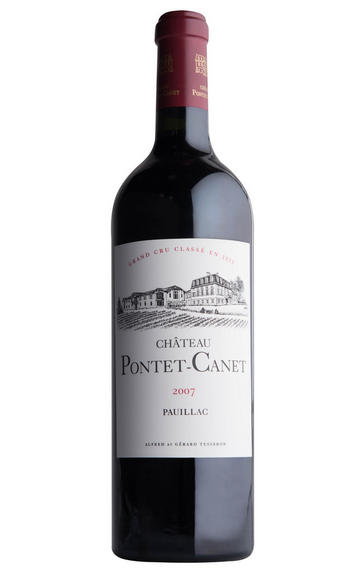
2007 Château Pontet-Canet, Pauillac, Bordeaux
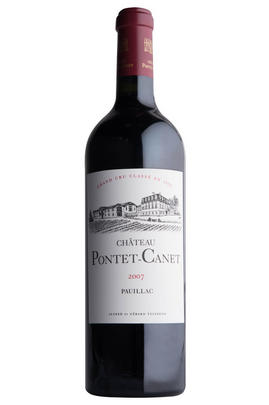
Critics reviews
Neal Martin - 30/06/2017
Jancis Robinson – www.jancisrobinson.com – Jan 10
Quite rich and sweet on the nose. Not very Pauillac-like! Good, firm tannins on the palate. A creditable attempt to spin some interest out of this vintage. But pretty low key. Tannins almost too dominant. Watery finish. But there is no shortage of effort here and the wine should have a longer life than many...
Jancis Robinson – www.jancisrobinson.com – Apr 08
Steven Spurrier - Decanter - May 08
About this WINE
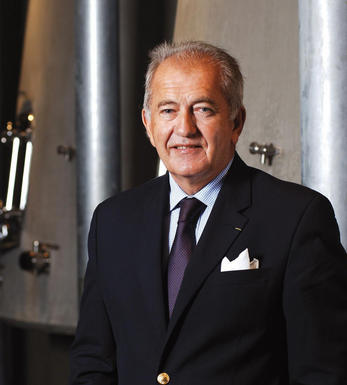
Chateau Pontet-Canet
Château Pontet-Canet is a large Pauillac estate that can trace its origins back to 1725, when Jean-François Pontet gave his name to the estate he had acquired. The wine was not château-bottled until 1972 and in 1975 the property was sold to Guy Tesseron, of the Tesseron family, one of the finest exponents of luxury, very old, aged Cognacs (Cognac Tesseron).
The Tesserons also own Château Lafon-Rochet in St-Estephe. Today, Château Pontet-Canet is owned and run by Alfred and Michel Tesseron.
Pontet-Canet's 78 hectares of vineyards adjoin those of Mouton Rothschild and are planted with Cabernet Sauvignon (63%), Merlot (32%) and Cabernet Franc (5%).
The Tesserons have vastly improved the quality of the Pontet-Canet wines which are now full-bodied and packed with ripe, chewy, black fruits and finely integrated tannins. The wines posseses marvellous ageing potential.
Pontet-Canet is classified as a 5ème Cru Classé.
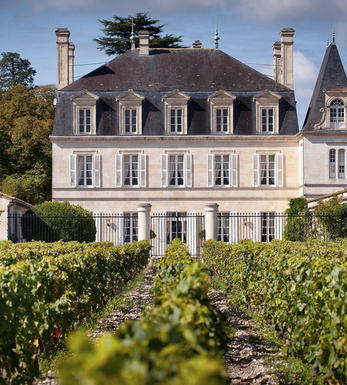
Pauillac
Pauillac is the aristocrat of the Médoc boasting boasting 75 percent of the region’s First Growths and with Grand Cru Classés representing 84 percent of Pauillac's production.
For a small town, surrounded by so many familiar and regal names, Pauillac imparts a slightly seedy impression. There are no grand hotels or restaurants – with the honourable exception of the establishments owned by Jean-Michel Cazes – rather a small port and yacht harbour, and a dominant petrochemical plant.
Yet outside the town, , there is arguably the greatest concentration of fabulous vineyards throughout all Bordeaux, including three of the five First Growths. Bordering St Estèphe to the north and St Julien to the south, Pauillac has fine, deep gravel soils with important iron and marl deposits, and a subtle, softly-rolling landscape, cut by a series of small streams running into the Gironde. The vineyards are located on two gravel-rich plateaux, one to the northwest of the town of Pauillac and the other to the south, with the vines reaching a greater depth than anywhere else in the Médoc.
Pauillac's first growths each have their own unique characteristics; Lafite Rothschild, tucked in the northern part of Pauillac on the St Estèphe border, produces Pauillac's most aromatically complex and subtly-flavoured wine. Mouton Rothschild's vineyards lie on a well-drained gravel ridge and - with its high percentage of Cabernet Sauvignon - can produce (in its best years) Pauillac's most decadently rich, fleshy and exotic wine.
Latour, arguably Bordeaux's most consistent First Growth, is located in southern Pauillac next to St Julien. Its soil is gravel-rich with superb drainage, and Latour's vines penetrate as far as five metres into the soil. It produces perhaps the most long-lived wines of the Médoc.
Recommended Châteaux
Ch. Lafite-Rothschild, Ch. Latour, Ch. Mouton-Rothschild, Ch. Pichon-Longueville Baron, Ch. Pichon Longueville Comtesse de Lalande, Ch. Lynch-Bages, Ch. Grand-Puy-Lacoste, Ch, Pontet-Canet, Les Forts de Latour, Ch. Haut-Batailley, Ch. Batailley, Ch. Haut-Bages Libéral.
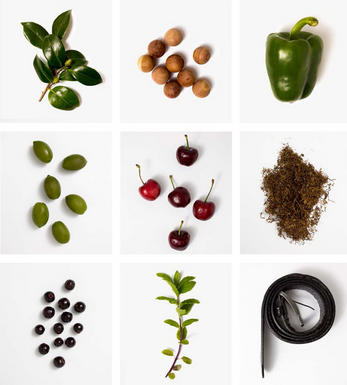
Cabernet Sauvignon Blend
Cabernet Sauvignon lends itself particularly well in blends with Merlot. This is actually the archetypal Bordeaux blend, though in different proportions in the sub-regions and sometimes topped up with Cabernet Franc, Malbec, and Petit Verdot.
In the Médoc and Graves the percentage of Cabernet Sauvignon in the blend can range from 95% (Mouton-Rothschild) to as low as 40%. It is particularly suited to the dry, warm, free- draining, gravel-rich soils and is responsible for the redolent cassis characteristics as well as the depth of colour, tannic structure and pronounced acidity of Médoc wines. However 100% Cabernet Sauvignon wines can be slightly hollow-tasting in the middle palate and Merlot with its generous, fleshy fruit flavours acts as a perfect foil by filling in this cavity.
In St-Emilion and Pomerol, the blends are Merlot dominated as Cabernet Sauvignon can struggle to ripen there - when it is included, it adds structure and body to the wine. Sassicaia is the most famous Bordeaux blend in Italy and has spawned many imitations, whereby the blend is now firmly established in the New World and particularly in California and Australia.


Buying options
Add to wishlist
Description
Journalists and merchants are sometimes quick to generalise and tend to group wines under the banner of a vintage. Bordeaux, however, is a big place, composed of 57 appellations – driving from one side to another can take up to two hours. These generalisations therefore don’t reflect the unique site of the region’s 7,500 châteaux accurately. There is no denying that 2007 was a difficult vintage, but there are plenty of wines that were overlooked en primeur and are just starting to unveil their true potential. Ch. Pontet-Canet is one of these and the wine is now at its best, combining velvety fruit with an underlying maturity. It is just turning a corner and will provide delicious drinking now and over the next five years – and at a fraction of the price of a “big” vintage.
Max Lalondrelle – Bordeaux Buyer, autumn 2018
It is a heresy severe enough to get you excommunicated, but in our view Ch. Pontet-Canet is as good as the First Growths in 2007. Working the vineyards according to organic and even biodynamic principles, dryly humorous owner Alfred Tesseron has produced a 2007 with lovely pure black fruit, ripe but present tannins, a mouth-watering finish and arguably the finest quality fruit in the vintage: silky, luscious, blackberries and plums with oodles of minerals, coffee, cedar and tobacco. Since the outstanding 2004, Ch. Pontet-Canet has been a must-have wine every year; in 2007 this is truer than ever.
wine at a glance
Delivery and quality guarantee